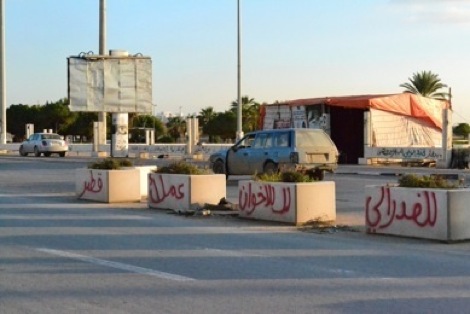Tripoli, 5 January:
Nearly two years after the beginning of Libya’s revolution, the
country is still going through a period of economic and political
uncertainty.
The security situation in parts of the country remains precarious,
and attacks in Benghazi appear to be on the rise again after a string of
killings targeting police officers in the city at the end of 2012.
However, federalists are taking advantage of these difficulties to
emerge as a credible alternative to the current system of government,
and the issue of drafting of Libya’s new constitution could be decisive
in helping them to win votes.
Written along the speedway in front of the Tibesti, Benghazi’s main
hotel, the graffiti reads: “Yes to federalism. No to Muslim Brotherhood
who are working for Qatar”. When people are asked how long it has been
there for, they have no idea. The slogan seems natural to them, even if
they don’t agree with the sentiment. Federalism certainly seems to be on
the rise.
Federalism “won’t go away”
“Federalism is getting bigger and bigger in Benghazi, mostly because
the government is failing in all sectors. MPs thought that federalists
were just a group of young people who were going to calm down, but they
won’t”, explained Dr. Abeir Imneina, a political science professor at
Benghazi University.
The latest attacks on public buildings in
the capital of Cyrenaica have not curbed enthusiasm for federalism.
Quite the contrary, in fact; some have been persuaded a federalized
government would be more able to deal with threats to the state.
So far, no one has claimed responsibility for the bombings. But
Abubaker M. Buera, president of the federalist National Union Party
(currently registering with the government), sees one group as at least
partly to blame for the instability: Tripoli and its over-centralized
government.
Buera promises that insecurity can be tackled in a more effective way
in a federal State. “Federalism doesn’t mean weakness. We could have
local police who know the field and the people and a federal police,
like the FBI in the United States”, he said.
Gaining ground across the country
“We have more and more support from the population. They have
understood the difference between federalism and independence. Even the
Amazigh tribes in the West and the Tebu in the South have accepted
federalism”, Buera told the Libya Herald.
Abdusalam Al-Furjani is looking forward to federalism. He is one the
policemen working in Benghazi’s Fayyad police station which was targeted
by a bomb in December. “The brigades have good cars and good weapons
compared to the police. We need better material. The government is doing
nothing for us”, he said. He added that he was sure a federal
government would be more able to supply them with the equipment they
needed to protect themselves better.
As the head of Benghazi local council’s media committee, Usama
Al-Sherif insists that relations between the local executive and the
General National Congress (GNC) are excellent. “What we need is more
decentralization – that’s all.”
He brushes aside the issue of federalism, adding: “We have no
statistics about the exact number of people who support federalism”.
However, he could not stop himself from making the distinction between
Easterners and Westerners: “In the East, everyone is against Gaddafi not
like in the West.”
Since the end of the revolution, the federalists are sure to have won
over a large number of Easterners to their vision of what Libya’s
future government should look like.

ليست هناك تعليقات:
إرسال تعليق